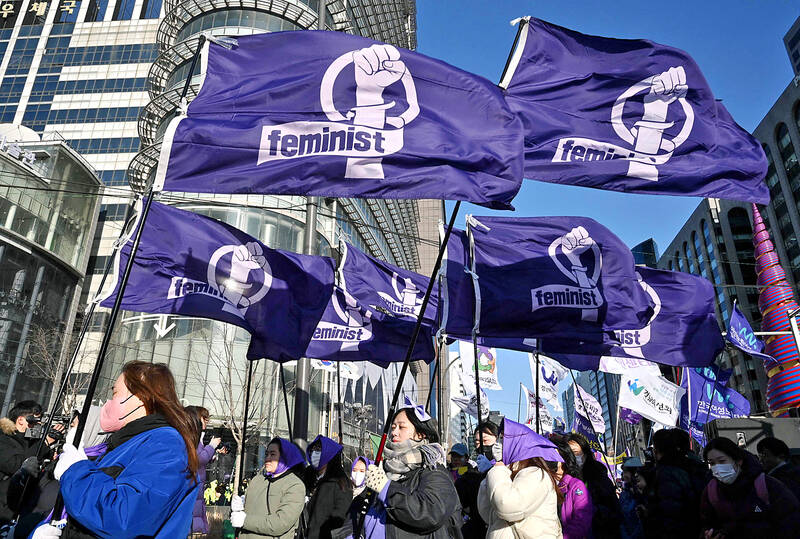No dating, sex, marriage or having children with men: South Korea’s extreme feminist movement “4B” has gone viral in America and beyond since Donald Trump won the US presidential election.
WHAT IS 4B?
In Korean, 4B stands for the “Four Nos”: dating, sex, marriage and childbearing with men.

Photo: AFP
The movement emerged in the mid-2010s in South Korea, against a backdrop of persistent pay disparity, entrenched gender roles and an epidemic of cyber sex crimes and sexual violence against women. Yet it has largely remained a fringe campaign.
Adherents like Baek Ga-eul, 33, say it has allowed them to be a “complete human being, not just a being reserved for a man or children.”
The movement arose because South Korean women — who do 3.5 times more work in the home per week than men, official data shows — cannot “accept the expectation to perform both paid labor and the majority of household duties,” she said.
In addition, women were fed up with “a male culture that pretends to be proper toward women while, behind closed doors... shares sex videos of their girlfriends with their male friends.”
WHY IS IT TRENDING?
As it became clear Trump had won the Nov. 5 US presidential election, 4B became one of the top trending search terms on Google in the US and elsewhere, with search volume increasing to the maximum on the interest scale, Google analytic data shows.
Videos about the movement were soon being widely shared on TikTok and Facebook, Newswhip data shows, with footage of women shaving their heads to protest Trump’s victory and breakdowns of the 4B movement particularly viral.
The election was seen by many as a referendum on women’s rights, in particular over Trump’s appointment of three conservative Supreme Court justices which resulted in the end of national abortion rights protections.
It made American women “realize that men do not regard women as equals,” Baek said.
“How can women love, marry, or have children with men who so openly hate and disregard us?”
“It was only a matter of time before the 4B movement extended beyond South Korea to the world,” she said.
WHAT’S HAPPENING IN SOUTH KOREA?
The wealthy country has one of the world’s lowest birth rates and plummeting rates of marriage.
Nearly 42 percent of South Korean households are headed by a single person, official figures show, and this is likely to rise.
Moreover, a 2021 study by Yonsei University found that more than 40 percent of Seoul residents in their 20s hadn’t had sex in a year.
Men cited not having a partner as their primary reason — but for women it was a “lack of interest.”
“South Korean women are still participating in the 4B movement in their own ways,” said one adherent who goes by JH. Even though “there are many Korean women who are not interested in feminism or have never even heard of the 4B,” they are inadvertently participating anyway, the 27-year-old said.
WHAT WILL IT ACHIEVE?
Sexism is entrenched in South Korea, said JH, who said she was bullied at work for involvement in the “Escape the Corset” feminist movement which rebels against strict beauty standards by, for example, encouraging women not to wear makeup. She eventually lost her job.
“What I went through is not unique for women in a misogynistic Korea,” she said.
“Boycotting men” is one of the most effective ways to show the severity of sexism in the country, said Kang Ji-young, another 4B participant.
The movement has grown out of “South Korean women’s painful contemporary experiences” said Keung Yoon Bae, a Korean studies professor at Georgia Institute of Technology in the US.
“It’s ultimately most accurate to view the movement as a symptom, one that reflects the untenable nature of pre-existing patriarchal norms of Korean society in light of the vastly increased number of high-achieving, well-educated women,” she said.
NEW ELECTION TREND?
In the US election, “voting patterns were strongly divided by gender across racial groups,” said Sharon Yoon, a Korean studies professor at the University of Notre Dame in the US, adding it was similar to South Korea’s 2022 presidential election. In South Korea, data indicates that men and women are increasingly ideologically opposed — with young men skewing far more conservative, which helped to propel President Yoon Suk-Yeol to power in 2022, after he promised to abolish the Ministry of Gender Equality.
“The gendered divide that we are seeing in voting behavior is not particular to a country, but is pointing to a global trend of gendered backlash among a growing base of economically precarious men,” she said. “The rise of President-elect Trump will also trigger a strong response from American women,” she said.
“Their expressions of solidarity with Korean women in the 4B movement should be seen as one, but not the sole, manifestation of this emerging trend.”

When life gives you trees, make paper. That was one of the first thoughts to cross my mind as I explored what’s now called Chung Hsing Cultural and Creative Park (中興文化創意園區, CHCCP) in Yilan County’s Wujie Township (五結). Northeast Taiwan boasts an abundance of forest resources. Yilan County is home to both Taipingshan National Forest Recreation Area (太平山國家森林遊樂區) — by far the largest reserve of its kind in the country — and Makauy Ecological Park (馬告生態園區, see “Towering trees and a tranquil lake” in the May 13, 2022 edition of this newspaper). So it was inevitable that industrial-scale paper making would

Asked to define sex, most people will say it means penetration and anything else is just “foreplay,” says Kate Moyle, a psychosexual and relationship therapist, and author of The Science of Sex. “This pedestals intercourse as ‘real sex’ and other sexual acts as something done before penetration rather than as deserving credit in their own right,” she says. Lesbian, bisexual and gay people tend to have a broader definition. Sex education historically revolved around reproduction (therefore penetration), which is just one of hundreds of reasons people have sex. If you think of penetration as the sex you “should” be having, you might

July 21 to July 27 If the “Taiwan Independence Association” (TIA) incident had happened four years earlier, it probably wouldn’t have caused much of an uproar. But the arrest of four young suspected independence activists in the early hours of May 9, 1991, sparked outrage, with many denouncing it as a return to the White Terror — a time when anyone could be detained for suspected seditious activity. Not only had martial law been lifted in 1987, just days earlier on May 1, the government had abolished the Temporary Provisions Effective During the Period of National Mobilization for Suppression of the Communist

Hualien lawmaker Fu Kun-chi (傅?萁) is the prime target of the recall campaigns. They want to bring him and everything he represents crashing down. This is an existential test for Fu and a critical symbolic test for the campaigners. It is also a crucial test for both the Chinese Nationalist Party (KMT) and a personal one for party Chairman Eric Chu (朱立倫). Why is Fu such a lightning rod? LOCAL LORD At the dawn of the 2020s, Fu, running as an independent candidate, beat incumbent Democratic Progressive Party (DPP) lawmaker Hsiao Bi-khim (蕭美琴) and a KMT candidate to return to the legislature representing